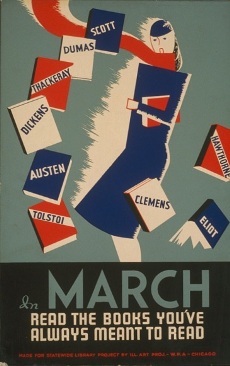Five Female Writers Who Changed The Course Of Chicago Literary History
By Maggie Hellwig in Arts & Entertainment on Mar 8, 2012 10:00PM
 March is Women's History Month; for 31 days we celebrate the women who have made our employment, the oration of our opinions, and our lifestyles possible.
March is Women's History Month; for 31 days we celebrate the women who have made our employment, the oration of our opinions, and our lifestyles possible.
When it comes to contemporary authors, there's plenty of strong female voices in Chicago. This wasn't always the case. Women have had to fight for their spot in society at the very least, and still are still presented with threats against their equal rights in today's political mess. The Christine Sneeds and Audrey Niffeneggers of Chicago can thank plenty of individuals for their publications, but here are a list of five Chicago ladies who paved the way for their success.
Harriet Monroe (1860-1936)
Poets of Chicago and the world in general can thank Miss Harriet Monroe for the work championing the genre. Monroe was the founder and editor of Poetry: A Magazine of Verse. After gaining some popularity as poet and freelancer for The Tribune, she became increasingly agitated over the lack of recognition—and funding—for poets. And so, in 1912, Monroe reached out to 100 head honchos in Chicago to pay for a subscription to her new poetry magazine. With this money, Poetry was launched. Its success was colossal in the genre: poets such as Ezra Pound, T.S. Elliot, and Carl Sandburg were all edited at one time or another by Monroe, and it was her support that ensured the longevity of their reputations.
Ida B. Wells (1862-1931)
Ida Wells is Chicago's First Lady of Civil Rights, and a pivotal player in the the Women's Suffrage Movement, Wells' influence was cast through the power of journalism. She dove straight into investigation and exploitation of lynching in the U.S. with her pamphlets: Southern Horrors: Lynch Law in All Its Phases and A Red Record. In 1893 she and Frederick Douglass, among several others, organized a boycott against the World's Columbian Exposition, arguing that the Exposition did not work with the black community to fairly display African American life. They distributed their pamphlet, Reasons Why the Colored American Is Not Like the Columbian Exposition, in protest. The list of Wells' articles and documentation is endless, but the influence remains: she asserted herself within Chicago's windy politics, and made it an easier place for the rest of us women to do so.
Lorraine Hansberry (1930-1965)
The play A Raisin in the Sun is how you know Lorraine Hansberry's name. The first Broadway play written by an African American woman, Hansberry raised the money herself to place the play in the Ethel Barrymore Theater. The play was later adapted into a musical titled simply Raisin, which won the Tony Award for Best Musical in 1973. And let us not forget the classic film starring Mr. Sydney Poitier in 1961. Her talent as a supreme playwright, and one with such social significance, greatly predates many current female writers. Another fact about Hansberry, one which wasn't discussed in our High School English courses, was her sexuality. Lorraine was a member of the first notable lesbian political organization: Daughters of Bilitis. She also had correspondence with several lesbian journals, and contributed to D.O.B.'s own journal The Ladder. In addition to her contribution to the literary community, Hansberry also may have been one of the first females of color to contribute openly to the LGBT society as well.
Gwendolyn Brooks (1917-2000)
Gwendolyn Brooks had an enormous breadth of experience and work as a poet. The first African American author to be awarded a Pulitzer Prize for her book Annie Allen, Brooks is probably best known for her first collection of poetry: A Street in Bronzeville. Both of these collections took snapshots of the urban poor, especially the disposition of women. Along with many more collections of poetry, she also published a novel called Maud Martha and two volumes of autobiography. Brooks was very outspoken, and supportive, of black literature. She believed publishing companies were quick to glaze over writers of color, due to their hesitation to promote the population. In the 1960s, she switched from publishing house Harper & Row to the African American run Broadside Press. Later in life, Brooks was appointed as the poetry consultant to the Library of Congress. She graciously accepted the position, the first woman of color to hold this specific honor.
Sandra Cisneros (1954-present)
While certainly not the least prominent of our crew, Sandra Cisneros is the most contemporary on our list. She, makes our list due to her influence on Chicana literature and her elaborate depiction of the Latin American population in Chicago. Cisneros is best known for her novel The House on Mango Street, inspired by her childhood with her six brothers and parents in Humboldt Park. The characters in her novels often are females struggling with not only their national identity, but their place as a female within society. Cisneros has received many, many awards for her writing, but she also founded the Macondo Foundation in 1998, which provides workshops for socially conscious writers. She also established the Alfredo Cisneros Del Moral Foundation, named in memory of her father, in 2000--the foundation awards very talented writers in Texas. While she no longer lives among us in Chicago, Cisneros continues to promote education, literacy, and a dedication to writing for with social purpose in San Antonio.